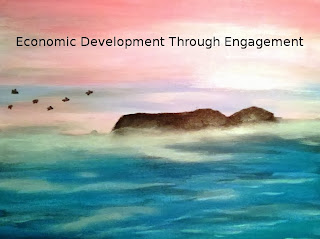Most of us
understand that knowledge and skills are important for economic development.
What we may not understand is how this is measured across varying countries to determine
if such growth is based in this human capital enhancement. A study by Hanushek
& Woessmann (2012) found that cognitive skills play a causal relationship
in economic growth. Their focus was based on averages of math and science
scores from 1964-2003 in different countries.
There are two
primary ways to measure cognitive skills on a macro-economic level. Time in
education focuses on the amount of years people went to school while cognitive
skills focus on the actual skills that people learn. The later measurements are
more difficult to obtain as each country measures these concepts differently
and measurements cannot be easily compared.
Skill is
not simply an additive process but also a multiplier process. Basic skills lead
to higher levels of skill development later. In other words, “skill begets skill through a multiplier
process” (Cunha et. al. 2006, p. 698). The skills learned at different
times of one’s life make their way into varying skill batteries as various
opportunities rise to use those skills. The person can move to higher skill
levels through past learning.
The
general premise is that the right education and skills offers a better catalyst
for economic growth than when these elements are not present. Human capital
increases the stream of new ideas that produce a higher rate of technological
development (Romer, 1990). That technological development raises market value
and per capita production rates leading to higher organizational and national
wealth.
Previous
studies have indicated that U.S. immigrants with high cognitive skills also
earned more money (Hanushek and Kimko, 2000) when compared to those with low
cognitive skills. These skills help to create greater skill development that
can be used to generate wealth and improve per capita Gross Domestic Product (GDP).
That GDP then makes its way into the Gross National Product (GNP) which is a
marker of a countries growth.
When skill
and education align in the market it can have an enormous impact on
development. According to Hanushek & Woessman (2011) improvements in these
areas can raise GDP 6.2% for up to 80 years. Each worker becomes more
productive and able to master the skills needed to take on new roles and
positions within the economy thereby fostering economic flexibility.
The
researchers found that cognitive abilities in endogenous growth models improve
upon the innovative and adaptive abilities of a nation. As more people engage
in the economic growth engine, and their personal development, the more growth expected.
Growth can change through economic shifts expanding growth in some countries
until a new homeostasis is found. Growth rates would then return to normal but at a higher income rate.
Cunha, F.,et. al. (2006).
Interpreting the evidence on life cycle skill formation. In E. A. Hanushek
& F. Welch (Eds.), Handbook of the Economics of Education. (pp. 697–812).
Amsterdam: Elsevier.
Hanushek,
E. & Woessman, L. (2012). Do better schools lead to more growth? Cognitive
skills, economic outcomes and causation. Journal
of Economic Growth, 17 (4).
Hanushek, E. A.,
& Kimko, D. D. (2000). Schooling, labor force quality, and the growth of
nations. American Economic Review, 90(5), 1184–1208.
Hanushek, E. A.,
& Woessmann, L. (2008). The role of cognitive skills in economic
development. Journal of Economic Literature, 46(3), 607–668.
Hanushek, E. A.,
& Woessmann, L. (2011b). How much do educational outcomes matter in OECD countries?.
Economic Policy, 26(67), 427–491.
Romer, P. (1990). Endogenous
technological change. Journal of Political Economy 99(5), pt. II: S71–S102.
